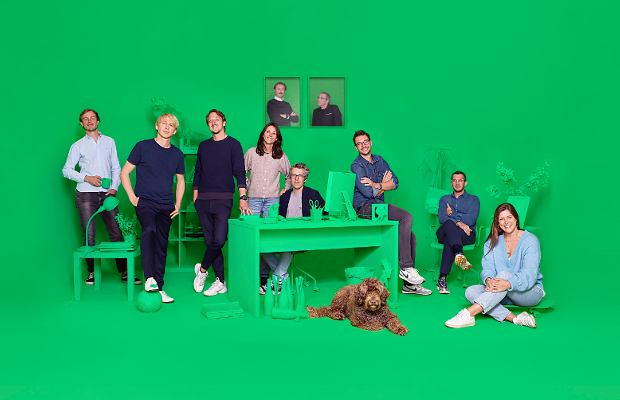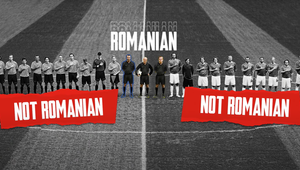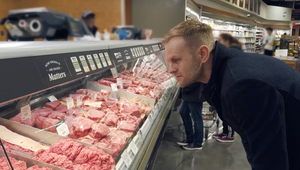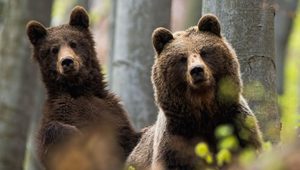
What Are ‘Creative Creative Directors’ and Why Does Advertising Need Them?

A few months ago, a group of five 30-something friends bowled into Brussels agency Air to take charge of change. Arnaud Bailly, Karel De Mulder, Romain Felix, John Benois and Renaud Goossens each signed a contract that will only end on the December 30th, 2050. Four of them took on a brand new job title - creative creative director - while Renaud joined as experience director.
The new team came into the agency, which is partnered with but not owned by McCann, to rebuild it into a shop that challenges the usual role held by creative agencies, the way of working with clients, the way people live and experience our creations and, lastly, the impact of brands on culture and the future.
To find out how the concept of a role with more creating involved in it than a standard CD fits into that narrative, Alex Reeves caught up with Karel.
LBB> What is a 'creative creative director'?
Karel> “Creative Creative Director” might not sound like the most creative job title we could give ourselves, but look at astrophysics, a hole that is black is named a black hole, a star that is red, a red star. In this way, a creative director that’s a creative too, makes ‘creative creative director’. You see, even though NASA is on our client wishlist, we’re not into rocket science.
LBB> Why was the standard 'creative director' title not applicable for you?
Karel> Looking at the basic job descriptions, where a creative creates all the time and a creative director gives directions all the time, we discovered that we are basically still too much in love with creating things... at least half of the time. The balance between ‘decision making’ and ‘making’ keeps us sharp, productive and above all, happy.
Also, we believe that defining a certain truth is not reserved for one person saying “yes” or “no”, but for multiple people saying, “what about this” or “what about that”. It results in different truths, different directions, different ideas. And the best of these ideas usually prevail.
LBB> Why is Air the right agency for this approach?
Karel> Friendship is key to our way of working. Trust, honesty, transparency…
When we met Eric Hollander (founder and creative chairman) and Stephane Buisseret (CEO and much more than that) we had an instant coup de foudre, both on a personal and professional level.
They were open for change - we were hoping for change.
They owned an independent agency with an admirable track record - we didn’t own one.
They had an entire team of talented people behind them - we had ourselves... and not to forget, Renaud Goosens behind us [Renaud is the experience director that joined Air together with them].
And we cannot forget to mention Louis Gheysens (business development manager at Air) in our story. He was playing with the idea of having all of us physically under one roof, long before we even thought of it.
Planets aligned, and if you look it up, that only happens roughly every 500 years.
LBB> How does this tie in more broadly with the way the McCann network functions? Air is independent but also a partner of the McCann Worldgroup. Right?
Karel> Yes. Air is above all an independent agency. This makes it possible for us to evolve at our own pace, take action and permanently reinvent ourselves. This being said, independence doesn’t mean alone. Back in 2014, Air became the exclusive partner for McCann Worldgroup in Belgium. The power of an international network combined with the independence of entrepreneurs allows us to, together with McCann, offer the best of both worlds. In short, Air is a local agency with a strong international arm.
LBB> Your contracts technically run until 2050. How does that actually work? Does that mean you have to work at Air until you retire now? And why?
Karel> 2050 is more a mindset.
You see, most creatives stay for four to five years in one agency to jump to the next for various and valid reasons. New challenges, new clients, new people, new opportunities, new salaries, etc. But taking part in an agency's management takes long-term dedication. So instead of changing agencies by moving every five years, we chose to create an agency that we can change every five years… or two, if needed. That’s why a contract ending on December 30th 2050 felt like the right period of time to sign for. The 31st happens to be a Saturday.
LBB> How does the idea of a CCD differ from the way that a horizontally-structured agency like Forsman & Bodenfors works - with a core team for each client that encompasses creative, account management and strategy but has no creative leadership exactly?
Karel> We haven’t worked at F&B, so we can’t really compare it objectively. But the difference between an agency with a core team per client and Air is that we are one core team overlooking all of our clients. It doesn’t mean we work an equal amount of hours on the same brief, but we do try to have everyone somehow involved on every project. This way no one owns a project… or better… this way everyone owns every project. Sharing the responsibility as well as sharing the credits makes you run an extra mile or two. Alexandre Dumas said it right: “All for one and one for all”.
LBB> You've won a number of clients since joining. What was key to these new business wins?
Karel> We have an awesome team at Air that was agile and willing enough to adapt to our new way of working really fast.
Three days prior to our starting day, we started working.
By the end of week one, we entered our first pitch presentation.
By the end of week two we had a first win and entered our second pitch presentation.
After that first win, we realised that we didn’t need three creative reviews with five creative ideas each time, to eventually go with an idea that was already presented during the first review. That’s why we don’t have reviews. We listen to ideas, pick ideas, land ideas and turn them into a campaign. Key to that is getting to know the briefing by heart to answer client expectations, above target.
Yes, we do challenge briefings if we see things differently, but understanding a client's need is like understanding a feature film. Every word in the script matters. Overlooking one sentence in a briefing is like going to the toilet in the middle of your film; missing that one shot you might be missing the entire plot. That’s why our big meeting room is in fact next to the toilets. And for almost the same reason, that’s why our great strategists sit next to the creatives.
And, besides presenting the work, we always present our story. Who we are, what we do, and how we interpret the idea of running an agency and servicing clients. It usually triggers them to join forces with us.
LBB> And what will characterise the work we'll soon see coming out of Air’s new form?
Karel> We hope our work will not have an Air watermark. Aiming for a certain style or Air-tone-of-voice would limit ourselves. And anyway, clients usually have enough guidelines to live by. Our only rule for the output is to be happy and proud of every piece of content we produce. [“And craft” we hear Eric yelling from the other side of the room.]
LBB> Anything else you'd like to add?
Karel> Yes, we do not claim to have found the magic formula. There’s plenty of structures that work great for other agencies. It’s a formula that happens to work best for ours, for now and hopefully until 2050.










